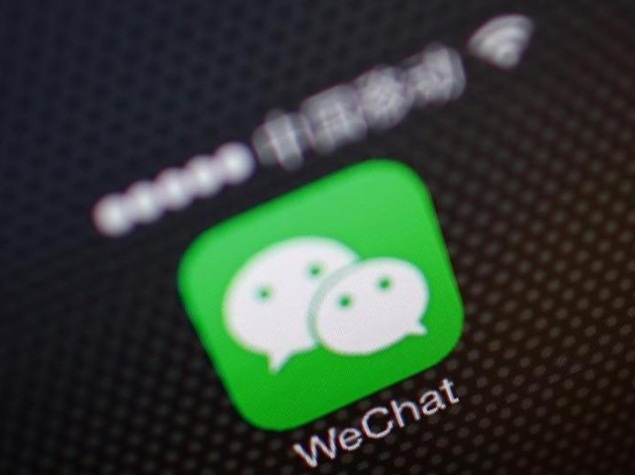The WeChat revolution: China's 'killer app' for mass communication
Advertisement

When condom maker Durex wants to send an intimate message to customers in China, it uses a homegrown instant messaging platform called WeChat which has taken the country by storm in just three years.
WeChat known as "weixin", or micro-message in Chinese has similarities to WhatsApp, the Silicon Valley start-up that Facebook bought for $19 billion last month.
(Also see: Facebook to buy WhatsApp in a $19 billion deal)
Now the CEO of its parent company hopes the service can go global, branding it China's "most hopeful product for internationalisation" but concerns about cyber security could hamper its ambitions.
WeChat is more versatile than WhatsApp, allowing its more than 300 million users to send text, photos, videos and voice messages over smartphones, find each other by shaking their devices a common dating technique and even book and pay for taxis.
Advertisement
Its popularity has gone beyond individuals, with corporations and even the government using the application developed by Chinese Internet giant Tencent for their internal and public communications.
Since the WhatsApp deal was announced, Hong Kong-listed Tencent's shares have risen 9.4 percent, giving it a market capitalisation of $150 billion, approaching Facebook's monumental $180 billion.
Advertisement
"WeChat is an extremely people-friendly platform, something consumers frequently use every day," said Fay Zhao, senior brand manager for Durex, which has asked its 200,000 followers to transmit "love stories" over WeChat in its latest campaign.
Analysts say WeChat has eroded the popularity of another form of Chinese social media microblogs or "weibo", the equivalent of Twitter which have been hurt by a government crackdown on content and users.
Advertisement
WeChat is now the country's second most popular instant messaging tool on mobile devices, according to consultancy Analysys International behind the venerable QQ platform, launched in 1999 and also owned by Tencent and is unlikely to be dislodged.
"WeChat, as a 'killer app' of Tencent on mobile Internet, has experienced a rapid increase in its user base since it commercialised in 2013," consultancy Analysys International said in a research report in February, referring to when it started charging for some services.
"Killer app" is technological terminology for a unique and wildly popular product.
WeChat is free to use, but charges for products such as emoticons and special features in games.
To retain users, WeChat has introduced new services alongside basic communication, including gaming, online payments and the taxi booking service.
Tencent acquired a 20 percent stake in Chinese restaurant listing platform Dianping.com in February and started offering dining coupons through WeChat.
Its latest deal, announced this week, sees Tencent take a 15 percent stake in Chinese online direct sales company JD.com, in a bid to better compete with e-commerce giant Alibaba.
Overseas expansion plans
Founded in 1998 in the southern boom town of Shenzhen, Tencent is one of China's largest Internet companies and rivals Alibaba and domestic search engine Baidu.
Now the firm's founder and CEO Pony Ma is putting high hopes on expanding WeChat abroad, budgeting $200 million for overseas marketing last year and hiring football superstar Lionel Messi for advertisements.
State media quoted Ma as calling the service "China's most hopeful product in terms of internationalisation".
But global concerns about cybersecurity could put a damper on its ambitions, analysts say.
Before former US National Security Agency contractor Edward Snowden's revelations of widespread electronic surveillance by the organisation, Washington and Beijing traded accusations of cyberspying for months.
US lawmakers have expressed worries over the security of telecommunications equipment sold by Chinese firms such as Huawei and ZTE, which the companies have denied.
China's Communist rulers maintain a huge surveillance network of their own in the country, including online, where the so-called Great Firewall of China blocks access to sites deemed sensitive, and a vast censorship machine deletes objectionable weibo posts and other content.
Meanwhile, Chinese Internet firms and foreign firms operating in China have in the past provided user information to authorities in cases ruled to involve state security.
Some Western users might have concerns over Internet security and the protection of personal data with WeChat, analysts said.
"American and European countries always have concerns over the safety and personal privacy issues of Chinese products," said iResearch analyst Lu Jingyu. "This might be an obstacle for its overseas development."
Other global players include Japan's Line, with more than 300 million registered users, and South Korea's Kakao Talk with over 100 million, which together dominate other Asian markets.
"There are already some well-established instant messaging products in the global market forming a natural barrier for the internationalisation of WeChat," said Dong Xu, an analyst for Analysys International.
On Tuesday, Tencent's shares closed up 0.16 percent at HK$617.50 ($80.19).
For the latest tech news and reviews, follow Gadgets 360 on X, Facebook, WhatsApp, Threads and Google News. For the latest videos on gadgets and tech, subscribe to our YouTube channel. If you want to know everything about top influencers, follow our in-house Who'sThat360 on Instagram and YouTube.
Advertisement
